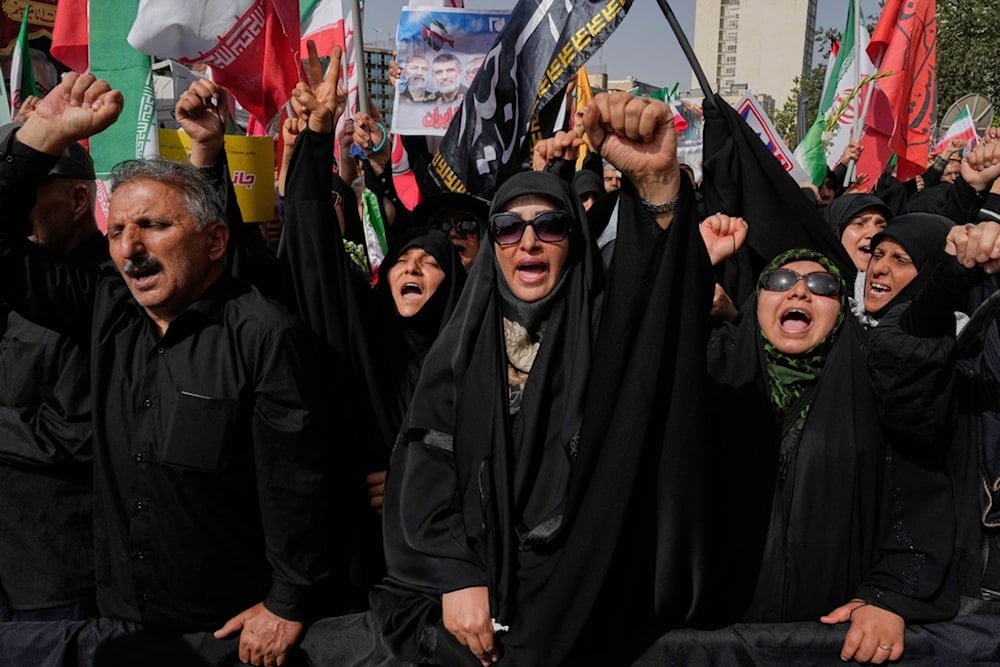IRGC: Israeli war on Iran failed to meet political objectives
Iran’s IRGC says the Israeli occupation's war on the country failed to achieve its goals, citing intelligence-led strikes, as Iran vows to strengthen its military for national defense.
-

Mourners chant slogans during the funeral ceremony of the Iranian armed forces generals, nuclear scientists, and their family members who were martyred in Israeli strikes, in Tehran, Iran, Saturday, June 28, 2025 (AP)
The spokesperson for Iran’s Islamic Revolution Guard Corps (IRGC), Brigadier General Ali Mohammad Naeini, stated on Thursday that the “true measure of victory in war is the achievement of political objectives, and the enemies failed to reach their goals from the Israeli aggression against Iran.”
Naeini explained that the IRGC possesses an extensive intelligence arsenal that was employed in its missile and drone strikes targeting the Israeli occupation. He further revealed that intelligence operations carried out by Tehran inside the occupied Palestinian territories provided additional data that strengthened Iran’s precision in its retaliatory attacks.
In a related context, Iran’s Army Chief of Staff, Major General Amir Hatami, emphasized on Wednesday that the country has no choice but to strengthen its military capabilities in order to defend its people, stressing that the current global order is based on the principle of “peace through strength.”
'Israel' begged for war to end
Iran’s Defense Ministry spokesperson, Brigadier General Reza Talaei-Nik, declared on Sunday that “Israel” had pleaded for a ceasefire in the recent war, one it initiated in an effort to divide Iran and weaken its national power.
According to Talaei-Nik, "the Zionist regime turned to the US government to stop the war and save itself." He stressed that “the enemy’s miscalculations came at a steep price, as ‘Israel’s’ military infrastructure was struck hard.”
In a similar vein, Iran’s defense minister has issued a warning to adversaries, stressing that the country possesses advanced military hardware yet to be revealed on any battlefield, which could be deployed in the event of renewed aggression.
Brigadier General Aziz Nasirzadeh made the remarks in a televised interview on Friday, emphasizing that Iran is prepared to escalate its defense measures if provoked. "If the enemy resorts to another aggression, we will certainly deploy equipment that has not been deployed yet," Nasirzadeh stated.
Iran says 'Israel' could not sustain a longer war
Reflecting on the recent 12-day war with “Israel,” Nasirzadeh suggested that prolonging the war would have left the enemy increasingly vulnerable, adding: "If the war had lasted 15 days, in the final three days, the enemy might not have been able to defend itself against any of our missiles."
He also pointed out the unsustainable financial cost for adversaries trying to counter Iran’s missile salvos. Systems such as Patriot and THAAD require expensive interceptors, he said, and once their stockpiles are depleted, reloading becomes a slow process. According to Nasirzadeh, this imbalance forced the Israeli entity to request a ceasefire within less than two weeks.
Operation True Promise 3 showcased Iran’s expanding missile and drone arsenal. According to the Islamic Revolution Guard Corps (IRGC), Iran launched more than 2,000 missiles and drones during the 12-day confrontation, while relying on only about a quarter of its total missile capacity.
Among the advanced systems deployed was the Sejjil ballistic missile, with a range of up to 2,500 kilometers and high-precision guidance, and the Fattah-1 hypersonic missile, capable of traveling at speeds of up to Mach 15. Iran also introduced the Kheibar (Qadr H) multi-warhead missile and fielded heavy Khorramshahr missiles carrying 1.5-ton warheads.
During the war, Iranian strikes targeted Israeli military bases, logistics centers, and intelligence sites, including the Tel Nof air base. Damages from the strikes were estimated at $3 billion.

 4 Min Read
4 Min Read










